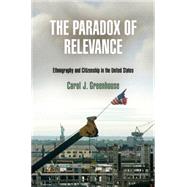The Paradox of Relevance
, by Greenhouse, Carol J.- ISBN: 9780812243123 | 0812243129
- Cover: Hardcover
- Copyright: 5/5/2011
Between 1990 and 1996, the U.S. Congress passed market-based reforms in the areas of civil rights, welfare, and immigration in a series of major legislative initiatives. These were announced as curbs on excessive rights and correctives to a culture of dependency among the urban poor-stock images of racial and cultural minorities that circulated well beyond the Congress. But those images did not circulate unchallenged, even after Congressional opposition failed. In The Paradox of Relevance, Carol J. Greenhouse provides a political and literary history of the anthropology of U.S. cities in the 1990s, where-below the radar-New Deal liberalism, with its iconic bond between society and security, continued to thrive. The Paradox of Relevanceopens in the midst of anthropology's so-called postmodern crisis and the appeal to relevance as a basis for reconciliation and renewal. The search for relevance leads outward to the major federal legislation of the 1990s, and the galvanic political tensions between rights- and market-based reforms. Anthropologists' efforts to inform those debates through "relevant" ethnography were highly patterned, revealing the imprint of political tensions in shaping their works' central questions and themes, as well as their organization, narrative techniques, and descriptive practices. In that sense, federal discourse dominates the works' demonstrations of ethnography's relevance; however, the authors simultaneously resist that dominance through innovations in their own literariness-in particular, drawing on diasporic fiction and sociolegal studies where these articulate more agentive meanings of identity and difference. The paradox of relevance emerges with the realization that in the context of the times, affirming the relevance of ethnography as value-neutral science required the textual practices of advocacy and art.






